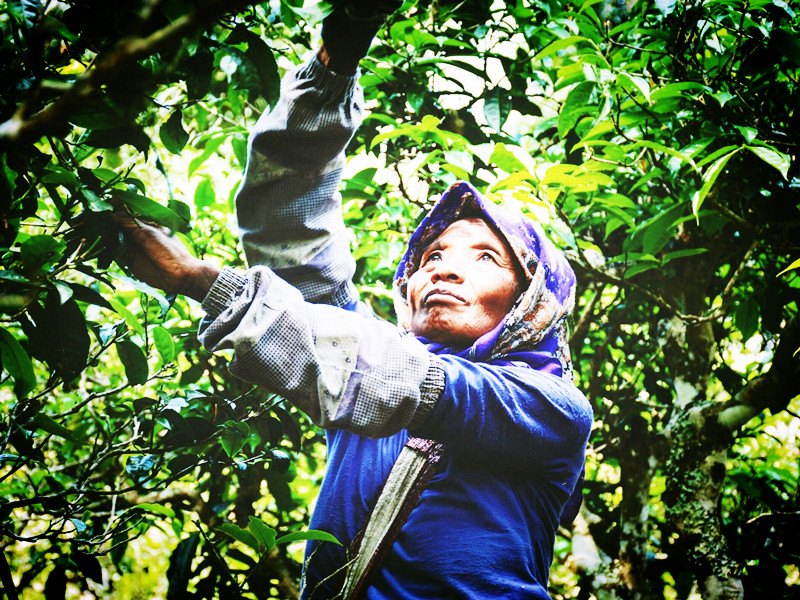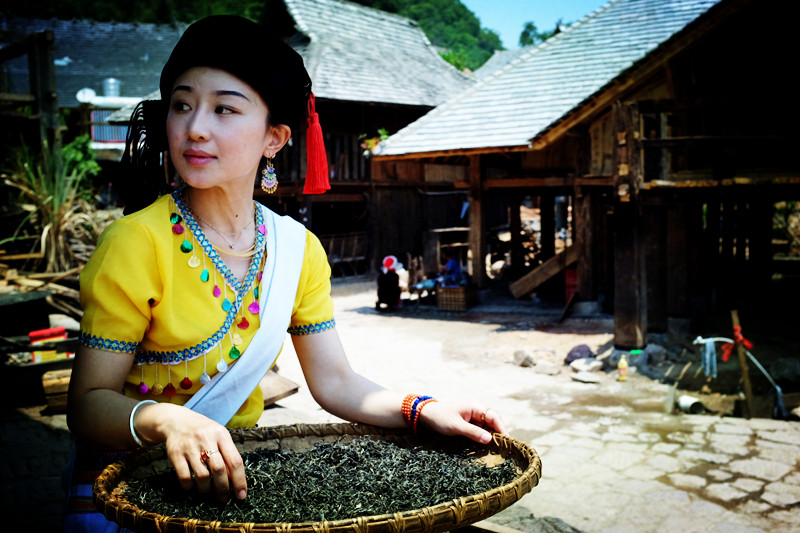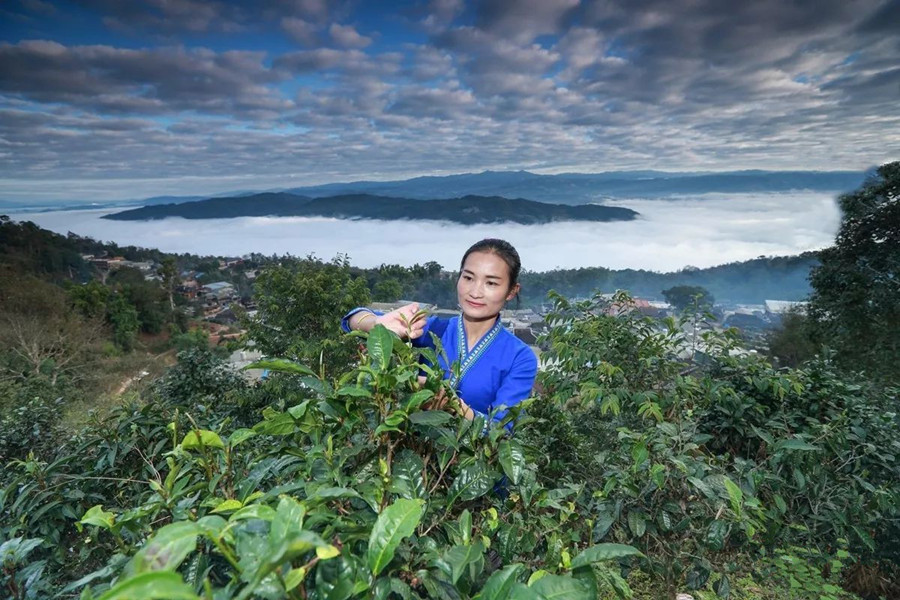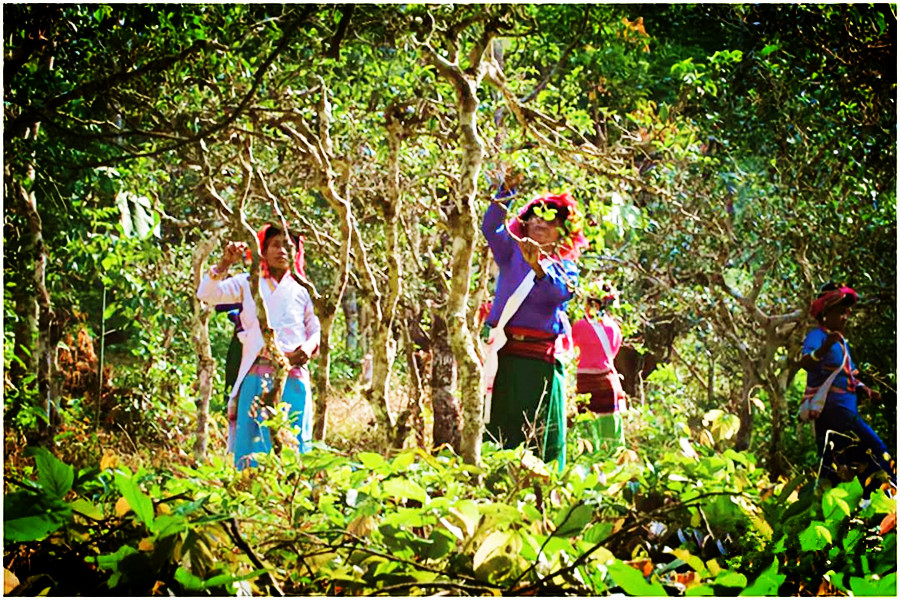How to Plan China Tea Tours in Yunnan and Anhui, Zhejiang, Fujian
China Tea Tours will take you to visit the most popular tea mountains and Tea Plantations in Yunnan Province. Yunnan is the home town of Puer Tea and Dianhong Black Tea. Travel along the Ancient Tea Horse Road, and explore these tea plantations and local tea factories in Dali, Lincang, Puer and XishuangBanna. Chinese tea acts as beverage, pastime, culture icon, and undoubtedly a way of enjoyment for thousands of years.
They are spread to the other parts of the world through trading routes of Silk Road and Tea & Horse Road along with silk and porcelain. Experience Chinese tea culture by exploring mist-covered mountains and plantations and meantime pay a visit to magnificent palaces and historical landmarks. Puer Tea and Dianhong Black Tea will be your trip highlights of Yunnan tea tour. Yunnan tea culture tours help you to do a deep research of Chinese tea and have the chance to enjoy various famous tea in Yunnan. How to plan a tea tour of Yunnan? and Yunnan Tea Travel Tips will be very helpful for your China tea trip.

Planning Tea Culture Tours in China: Yunnan, Zhejiang, Anhui, and Fujian
Embark on a journey through China’s most renowned tea-producing regions, experiencing the rich heritage and diverse flavors of Chinese tea. Here’s a comprehensive guide to planning tea culture tours in Yunnan, Zhejiang, Anhui, and Fujian.
Yunnan Province
Kunming
Highlights:
- Tea Markets: Visit the large tea markets in Kunming to sample and purchase a variety of teas.
- Western Hills: Explore the scenic Western Hills and enjoy tea with a view of Dianchi Lake.
- Tea Culture Centers: Learn about tea history and culture at local museums and cultural centers.
Recommended Itinerary:
- Day 1-2: Arrive in Kunming. Visit local tea markets and the Western Hills.
- Day 3: Explore tea culture centers and museums.
Lincang
Highlights:
- Tea Plantations: Visit famous tea plantations known for Pu-erh and Dianhong Black Tea.
- Tea Factories: Tour tea processing factories to see the production of Pu-erh tea.
Recommended Itinerary:
- Day 1-2: Visit tea plantations and learn about tea cultivation.
- Day 3: Tour local tea factories and participate in tea tasting sessions.
Jingmai Ancient Tea Mountain in Lancang County, Puer
Pu’er
Highlights:
- Ancient Tea Horse Road: Explore the historical trade routes.
- Pu’er Tea Gardens: Visit extensive tea gardens and participate in tea-picking activities.
Recommended Itinerary:
- Day 1-2: Explore the Ancient Tea Horse Road and visit Pu’er Tea Gardens.
- Day 3: Participate in tea-picking and processing activities.
Jingmai Ancient Tea Mountain in Lancang County, Puer
Xishuangbanna
Highlights:
- Dai Minority Villages: Experience the tea culture of the Dai ethnic minority.
- Tropical Tea Plantations: Visit tea plantations in a lush, tropical setting.
Recommended Itinerary:
- Day 1-2: Visit Dai minority villages and learn about their tea traditions.
- Day 3: Tour tropical tea plantations and enjoy local tea ceremonies.
Zhejiang Province in China is renowned for its tea culture, especially around Hangzhou and the surrounding areas. Here are some highlights and suggestions for tea tours in Zhejiang:
- Longjing Tea (Dragon Well Tea) in Hangzhou:
- Location: Longjing Village (Dragon Well Village), located southwest of West Lake in Hangzhou.
- Experience: Visit tea plantations where Longjing tea, one of China’s most famous green teas, is grown. You can see the traditional methods of harvesting and processing tea leaves. Many tea farms offer guided tours where you can learn about the history, cultivation, and preparation of Longjing tea.
- Meijiawu Tea Village:
- Location: Near West Lake in Hangzhou.
- Experience: This village offers a more rustic and authentic experience compared to the touristy Longjing Village. You can visit local tea houses, observe tea-making demonstrations, and even participate in picking tea leaves during the harvest season.
- Anji White Tea Plantations:
- Location: Anji County, northwest of Hangzhou.
- Experience: Anji is famous for its delicate white tea, known for its pale color and subtle flavor. The tea plantations here offer serene landscapes and a chance to witness the meticulous process of harvesting and producing white tea.
- Mogan Mountain Tea Plantations:
- Location: Mogan Mountain, Deqing County.
- Experience: Known for its cooler climate, Mogan Mountain produces a variety of teas including green tea and black tea. The mountainous scenery adds to the charm of visiting tea plantations here.
- Tea Culture Museum in Hangzhou:
- Location: Hangzhou.
- Experience: If you want to delve deeper into the history and culture of tea in Zhejiang, consider visiting the Tea Museum in Hangzhou. It offers exhibits on tea production, traditional tea ceremonies, and the significance of tea in Chinese culture.
When planning a tea tour in Zhejiang, it’s advisable to arrange visits through reputable tour operators or directly with tea farms to ensure an informative and authentic experience. Many tours include tea tastings and opportunities to purchase fresh tea directly from the source.
Hangzhou
Highlights:
- Longjing Tea Village: Visit the birthplace of Dragon Well (Longjing) tea.
- West Lake: Enjoy tea by the picturesque West Lake.
Recommended Itinerary:
- Day 1-2: Visit Longjing Tea Village, tour tea plantations, and learn about Dragon Well tea production.
- Day 3: Relax by West Lake and enjoy tea in traditional tea houses.
Anhui Province in China is famous for its tea culture, particularly known for producing high-quality varieties such as Huangshan Maofeng and Keemun tea. Here are some recommendations and highlights for tea tours in Anhui Province:
- Huangshan (Yellow Mountain) Tea Plantations:
- Location: Near Huangshan City.
- Experience: Huangshan Maofeng tea is one of the most famous teas from this region, known for its delicate flavor and floral aroma. Tourists can visit tea plantations on the slopes of Huangshan Mountain and observe the traditional methods of tea cultivation and processing. The scenic beauty of Huangshan adds to the allure of the tea tour experience.
- Qimen County (Keemun Tea):
- Location: Qimen County, Huangshan City.
- Experience: Keemun tea, also known as Qimen black tea, is renowned for its bold flavor and wine-like characteristics. In Qimen County, visitors can tour tea factories and plantations to learn about the production process, from picking the tea leaves to the final drying and sorting stages. There are opportunities to taste freshly brewed Keemun tea and purchase tea products directly from local producers.
- Taiping Houkui Tea Plantations:
- Location: Taiping County, Anqing City.
- Experience: Taiping Houkui is a unique green tea known for its large, flat leaves and distinctive taste. The tea plantations in Taiping County offer visitors a chance to witness the meticulous handcrafting process of Taiping Houkui tea, which involves pressing and flattening the leaves. You can participate in tea tastings and learn about the history and cultural significance of this local specialty.
- Xuancheng Tea Plantations:
- Location: Xuancheng City.
- Experience: Xuancheng is known for producing a variety of teas including green tea and black tea. Tea tours in Xuancheng provide insights into different tea processing techniques and the local tea culture. Visitors can explore tea gardens, interact with tea farmers, and enjoy scenic views of the countryside.
- Tea Culture Museums and Tea Houses:
- Locations: Throughout Anhui Province.
- Experience: In addition to visiting tea plantations, tourists interested in tea culture can explore tea museums and traditional tea houses in cities like Huangshan and Anqing. These venues offer exhibitions on tea history, tea ceremonies, and the art of tea making in Anhui Province.
When planning a tea tour in Anhui Province, it’s recommended to arrange visits through local tour operators or directly with tea farms and museums to ensure an informative and enjoyable experience. Many tours offer guided visits, tea tastings, and opportunities to purchase authentic Anhui teas directly from the source.
Huangshan
Highlights:
- Huangshan Maofeng Tea: Visit tea gardens producing Huangshan Maofeng tea.
- Huangshan Mountains: Enjoy tea with stunning mountain views.
Recommended Itinerary:
- Day 1-2: Tour tea gardens and learn about Huangshan Maofeng tea.
- Day 3: Explore Huangshan Mountains and enjoy tea at scenic spots.
Fujian Province
Fujian Province in China is renowned for its rich tea heritage and produces some of the finest teas in the world, including famous varieties like Tieguanyin, Jasmine tea, and Wuyi Rock tea (Yancha). Here are some highlights and suggestions for tea tours in Fujian Province:
- Anxi County (Tieguanyin Tea):
- Location: Anxi County, Quanzhou City.
- Experience: Anxi is the birthplace of Tieguanyin, a famous oolong tea known for its floral fragrance and unique taste. Tea tours in Anxi typically include visits to tea plantations where Tieguanyin is grown, tea processing facilities where you can observe traditional roasting techniques, and opportunities to participate in tea tastings.
- Wuyi Mountain (Wuyi Rock Tea/Yancha):
- Location: Wuyi Mountain, Nanping City.
- Experience: Wuyi Rock tea, or Yancha, is a category of oolong teas grown in the Wuyi Mountain region, known for their complex flavors and mineral-rich terroir. Tea tours in Wuyi Mountain offer breathtaking scenery of steep cliffs and lush greenery, along with visits to ancient tea trees, tea caves, and traditional tea houses where you can learn about the intricate process of crafting Yancha.
- Fuding and Zhenghe Counties (White Tea):
- Location: Fuding and Zhenghe Counties, Ningde City.
- Experience: Fujian Province is renowned for its white tea, particularly Silver Needle (Baihao Yinzhen) and White Peony (Bai Mudan). Tea tours in Fuding and Zhenghe allow visitors to explore tea gardens where white tea cultivars are grown, learn about the delicate plucking and withering process, and sample different grades of white tea.
- Jasmine Tea in Fuzhou:
- Location: Fuzhou City.
- Experience: Fuzhou is famous for its Jasmine tea, where green tea leaves are scented with fresh jasmine flowers. Tea tours in Fuzhou often include visits to jasmine plantations, where you can observe the scenting process and enjoy the sweet fragrance of freshly harvested jasmine tea.
- Tea Culture Centers and Museums:
- Locations: Throughout Fujian Province.
- Experience: To deepen your understanding of Fujian’s tea culture, consider visiting tea museums and culture centers in cities like Xiamen and Quanzhou. These venues showcase the history of tea production, traditional tea ceremonies, and the significance of tea in Chinese culture.
When planning a tea tour in Fujian Province, it’s advisable to arrange visits through reputable tour operators or directly with tea farms and museums to ensure an authentic and educational experience. Many tours offer guided visits, tea tastings, and opportunities to purchase high-quality Fujian teas directly.
Anxi
Highlights:
- Tieguanyin Tea: Visit the region famous for Tieguanyin oolong tea.
- Tea Workshops: Participate in tea-making workshops.
Recommended Itinerary:
- Day 1-2: Tour Tieguanyin tea plantations and factories.
- Day 3: Participate in tea workshops and tastings.
Wuyishan
Highlights:
- Wuyi Rock Tea: Explore the area known for its distinctive rock teas.
- Wuyishan Scenic Area: Enjoy tea amidst beautiful mountain scenery.
Recommended Itinerary:
- Day 1-2: Visit rock tea plantations and learn about Wuyi Rock Tea.
- Day 3: Explore Wuyishan Scenic Area and enjoy tea ceremonies.
Travel Tips for a Successful Tea Tour
- Best Time to Visit: Spring (April to June) and autumn (September to November) are the best times to visit for tea tours, as these are prime tea-picking seasons.
- Local Guides: Hire local guides who are knowledgeable about tea culture and can provide in-depth information.
- Comfortable Attire: Wear comfortable clothing and shoes suitable for walking in tea plantations and hilly areas.
- Cultural Respect: Be respectful of local customs, especially when visiting ethnic minority villages.
- Tasting Etiquette: Learn basic tea-tasting etiquette to fully appreciate the experience.
By following this guide, you can plan an enriching and memorable tea culture tour across China’s most famous tea-producing regions. Enjoy the rich flavors, scenic beauty, and cultural depth that each destination has to offer.

Best and Allaround Yunnan Tea Culture Tours
- 15 Days Southwest Yunnan Ancient Tea Culture Tour
- 16 Days Southwest Yunnan Ancient Tea Culture Tour
- 8 Days Best Yunnan Pu’er Tea Tour to Kunming-Puer-XishuangBanna
- 10 Days Best Yunnan Classic Tour with Dianhong Black Tea Culture Tour
- 11 Days Southwest Yunnan Dianhong Black Tea and Puer Tea Culture Tour
- 7 Days Kunming, Dali and Lijiang Tour with Dianhong Black Tea Culture Tour
- 8 Days Dali, Lincang and Puer Tea Tour with Fengqing Dianhong Black Tea Factory
Dali Tea Culture Tours
Lincang Tea Culture Tours
- 2 Days Fengqing Dianhong Black Tea Culture Tour from Dali
- 7 Days Lincang Fengqing Dianhong Black Tea and Puer Organic Tea Tour
- 10 Days Yunnan Puer Tea and Dianhong Black Tea Tour to Lincang and Fengqing
Xishuangbanna – Puer Tea Culture Tours
- 7 Days XishuangBanna and Puer Tea Culture Tour
- 6 Days Puer and XishuangBanna Coffee, Tea and Minority Culture Tour
- 12 Days XishuangBanna and Puer Tea Culture Tour with Qianjiazhai Ancient Tea
- 11 Days XishuangBanna and Puer Ancient Tea Culture Tour with Yiwu Mountain Tea Plantation
Yunnan Tea Tours to Tea Mountains and Tea Plantations
- 6 Days XishuangBanna Tea Mountain Hiking Tour
- 1 Day XishuangBanna Nannuo Tea Mountain Tour
- 4 Days Puer Tea Culture Tour with Jingmai Tea Mountains
- 6 Days XishuangBanna Yiwu Mountain Tea Culture Hiking Tour
- 3 Days XishuangBanna Tea Culture Tour to Yiwu and Nannuo Tea Mountains
- 6 Days XishuangBanna Tropical Forest and Jingmai Ancient Tea Mountain Hiking Tour
Yunnan Ancient Tea Horse Road Tours
- 16 Days Best Yunnan Tea Tour along the Ancient Tea Horse Road
- 13 Days Yunnan Tour along the Ancient Tea Horse Road from Jinghong to Shangri-La
- 11 Days Yunnan Ancient Tea-Horse Road Tour with Puer and XishuangBanna Tea Culture Exploration
- 13 Days Yunnan Ancient Tea Horse Road Discovery and Puer Tea Culture Tour~From XishuangBanna to Puer and Dali
Travel Tips for Yunnan Tea Culture Tours
- Ancient Tea Culture Tours Routes in Puer
- How to Plan Tea Culture Tour in Yunnan
- 9 Days Tea Culture Travel Guide in Puer City
- Top 8 Puer Tea Plantation Villages in Jingmai Tea Mountain
- 3 Days Yunnan Ancient Tea Horse Road Cycling Travel from Puer to Jinghong
- Yunnan Puer Tea Travel Tips for Six Ancient Tea Mountains of Yiwu in XishuangBanna
- Yunnan Puer Tea Travel Tips for New Six Ancient Puer Tea Mountains of Menghai in XishuangBanna

 7 Days GolfingTour
7 Days GolfingTour
 8 Days Group Tour
8 Days Group Tour
 8 Days Yunnan Tour
8 Days Yunnan Tour
 7 Days Shangri La Hiking
7 Days Shangri La Hiking
 11 Days Yunnan Tour
11 Days Yunnan Tour
 6 Days Yuanyang Terraces
6 Days Yuanyang Terraces
 11 Days Yunnan Tour
11 Days Yunnan Tour
 8 Days South Yunnan
8 Days South Yunnan
 7 Days Tea Tour
7 Days Tea Tour
 8 Days Muslim Tour
8 Days Muslim Tour
 12 Days Self-Driving
12 Days Self-Driving
 4 Days Haba Climbing
4 Days Haba Climbing
 Tiger Leaping Gorge
Tiger Leaping Gorge
 Stone Forest
Stone Forest
 Yunnan-Tibet
Yunnan-Tibet
 Hani Rice Terraces
Hani Rice Terraces
 Kunming
Kunming
 Lijiang
Lijiang
 Shangri-la
Shangri-la
 Dali
Dali
 XishuangBanna
XishuangBanna
 Honghe
Honghe
 Kunming
Kunming
 Lijiang
Lijiang
 Shangri-la
Shangri-la
 Yuanyang Rice Terraces
Yuanyang Rice Terraces
 Nujiang
Nujiang
 XishuangBanna
XishuangBanna
 Spring City Golf
Spring City Golf
 Snow Mountain Golf
Snow Mountain Golf
 Stone Mountain Golf
Stone Mountain Golf
















